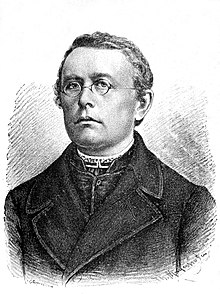Shche ne wmerla Ukrajina
| Ще не вмерла Україна | |
|---|---|
| transcription | Shche ne wmerla Ukrajina |
| Title in German | Ukraine's fame and freedom have not yet died |
| country |
|
| Usage period | 1920 - today |
| text | Pavlo Chubynskyi |
| melody | Mychajlo Werbyzkyj |
| Sheet of music | Sheet music on Wikimedia Commons |
| Audio files | |
Shche ne vmerla Ukrajina ( Ukrainian Ще не вмерла Україна , "yet did not die Ukraine") is the Ukrainian national anthem , the text of the current version with the words Shche ne vmerla Ukrajin y i slawa, i volya ( Ще не вмерла Україн и і слава, і воля 'yet are the Ukraine fame and freedom did not die') begins .
Emergence
The Ukrainian ethnographer , folklorist and poet Pavlo Chubynskyj wrote the patriotic poem “Ukraine Has Not died yet” in the autumn of 1862, the text of which became the national anthem long before Ukraine existed as an independent state. In the first line in particular, he was based on “Poland is not yet lost” in Mazurek Dąbrowskiego - a motif that was also taken up in the Pan-Slavic hymn (“Our Slavic language is still alive”). The background is the Slavic rebirth movement of the Slavs under foreign rule. (In 1862 there was only Russia of the 13 independent Slavic states today.)
The poem quickly spread both in Ukrainian groups and in popular circles. A sign of this was that on November 20, the gendarmerie chief Dolgorukov ordered Chubynskyi to be relocated to the Arkhangelsk governorate under police supervision "because of his harmful influence on the thoughts of the people" .
In 1863 the poem was published for the first time in the Lviv magazine Мета ("Ziel", issue no. 4). As it became more widespread in western Ukraine, the patriotic text also attracted the attention of church dignitaries. One of them, the Catholic priest Mychajlo Werbyzkyj , also a well-known composer of his time, was so enthusiastic that he composed the music for it, initially for voice, later with orchestral accompaniment. In 1865 the poem set to music was published with sheet music.
In 1917 the hymn was sung as the state anthem of the young Ukrainian People's Republic; however, during the period of brief independence between 1917 and 1920, it was not officially designated as the state anthem; there were several pieces that served as national anthems.
After the dissolution of the Soviet Union and the establishment of an independent Ukraine in 1991, Werbyzkyi's music was enshrined in Article 20 of the constitution as an anthem, but the decision on the wording to be sung was left to the legislature. The pessimistic tone of the anthem probably also contributed to the fact that the law "On the national anthem of Ukraine" introduced by President Leonid Kuchma was only passed in the Supreme Council on March 6, 2003 . Here the first stanza and the refrain of the poem by Chubynskyj were determined in a slightly varied form as the hymn text. The first stanza originally contained the words “Ukraine has not died yet, neither fame nor freedom” - by changing a single letter, a grammatical ending of the word “Ukraine” it now reads: “Ukraine's fame and freedom have not yet died, ". In addition, the term “Ukrainian brothers” was changed to “young brothers” in the second line, probably a reminder of the fact that not only people of Ukrainian nationality live in Ukraine . At the same time, however, the term reinforces the strong connection with the “Cossack” past, the myth of the strong, brotherly coexistence in the Cossack state .
Hymn text
|
Ukrainian:
Ще не вмерла України і слава, і воля, |
Transcription:
Schche ne wmerla Ukrajiny i slawa, i volja, Schch |
|
German:
Ukraine's fame and freedom have not yet died |
See also
Web links
- Schtsche ne wmerla Ukrajiny (MP3) dead link
- Audio
- Translation into German and history



